
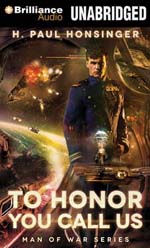 To Honor You Call Us (Man of War #1)
To Honor You Call Us (Man of War #1)
By H. Paul Honsinger; Read by Ray Chase
Publisher: Brilliance Audio
Publication Date: 18 February 2014
[UNABRIDGED] – 13 hours
Themes: / military SF / swords in space / rat-faced aliens /
Publisher summary:
The Terran Union is engaged in a vast interstellar war against the KragRuthless aliens intent on exterminating humankind. In 2315, the wily Max Robichaux is given command of the USS Cumberland, a destroyer with state-of-the-art capabilities but a combat record so bad, she’s known as the “Cumberland Gap.”Capt. Robichaux’s first mission: to take his warship to the Free Corridor, where the Krag have secretly been buying strategic materials, and to seize or destroy any ships carrying enemy cargo. Far from the fleet and under enforced radio silence, Max relies only on his determination and guile…and the support and friendship of his chief medical officer, the brilliant Dr. Sahin.Because even as he deals with the ship’s onboard problems and the stress of carrying out her risky assignment, Max and the doctor discover that the Cumberland and her misfit crew are all that stands in the way of a deadly Krag attack that threatens to end the war—and humanity—once and for all.A far-future story in the tradition of “ships of wood, men of iron” novels, To Honor You Call Us and the Man of War series combine the adventure of exploration, the excitement of war, and the dangers of the unknown through the eyes of a ship and her crew.
H. Paul Honsinger’s To Honor You Call Us is on the softer side of Military SF. Rat-faced aliens religiously motivated and determined to exterminate humans play the role of villain. The stage is the stars, and the stars teem with alien life. Some species resemble catfish; others appear to mirror carnivorous teddy bears.
The year is 2315. Rough and tumble Max Robichaux is promoted to Captain, and the story follows his journey into deep space to fight the dreaded rat-faced Krag. In this era of FTL (Faster Than Light) space jumps, pulse cannons, and universal interspecies translators, we also encounter boarding parties, cutlasses, traditional firearms, beer and liquor rations, and battle-axes.
I struggled with this book. The characters are not very engaging, the dialogue feels clunky, and neither of these are helped by a novel written entirely in passive voice. Honsinger overloads his prose with anachronistic stumbling blocks jarring the reader from the 2315 present-day. I didn’t want to at first, but I was willing to accept sword wielding boarding parties in space. I drew the line at the ships commissary selling t-shirts (all sizes), ball caps, pins, coffee mugs, pillowcases, pendants, charm bracelets, polo shirts, shotglasses, workout shorts, throw pillows, Christmas tree ornaments, etc. When I encounter a character saying, “Maybe Santa Claus will come by in his sleigh and act as a missile decoy,” I stop and scratch my noggin. The year is 2315, what character drops this antiquated holiday reference? And why does a character observe, “The sounds reminded Max of a child playing with his oatmeal by using a drinking straw to make bubbles.” Are there really still straws and oatmeal in 2315? Don’t get me wrong, I like oatmeal, but I’ve never used a straw with it before.
The struggle lies in Honsinger’s earnest desire for his story to be taken seriously. If this had been presented as a farce, a jape upon the genre of Military SF like the film Galaxy Quest poked good-naturedly at its contemporary counterparts, I could have better rolled with the punches. Unfortunately, that is not the case. Honsinger’s incessant desire to drop knowledge in the form of military history on the reader is tiring, and does nothing to advance the story. When it’s all said and done, this reads like fanfic, poorly written fanfic.
I listened to the audiobook. Ray Chase is the narrator, and damned if he didn’t make this book better.
Since To Honor You Call Us is the first in the Man of War series, I fully expect Honsinger’s writing to improve as the story continues. And while I do feel burned by this book, I might be willing to pick up the next volume, in time, if Honsinger figures out what he is writing, drops the passive voice, and commits to more intensive revision.
Posted by Casey Hampton.

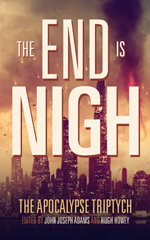 The End is Nigh (Apocalypse Triptych #1)
The End is Nigh (Apocalypse Triptych #1)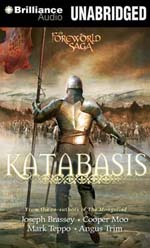 Katabasis (Mongoliad Cycle #4)
Katabasis (Mongoliad Cycle #4)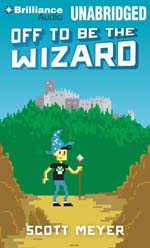 Off to Be the Wizard (Magic 2.0 #1)
Off to Be the Wizard (Magic 2.0 #1)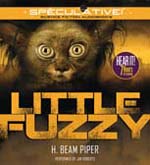 Little Fuzzy
Little Fuzzy To Honor You Call Us (Man of War #1)
To Honor You Call Us (Man of War #1)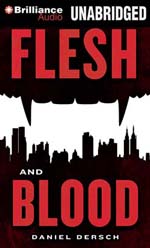 Flesh and Blood
Flesh and Blood